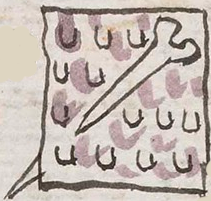tlazotl (Mdz15v)
This element for something pierced (tlazotl) has been carved from the compound place name Zozollan. It shows a square piece of fabric that may have holes and lavender-colored stains on it. A white, bone needle pierces the fabric. Carved bones were known to have been used in bloodletting, which was a religious, auto-sacrificial activity.
Stephanie Wood
The cloth--with its possible issues--may be pointing to the adjective zozoltic (old and worn-out), which has a reduplication of the "zo." The needle and its corresponding implication, either to pierce (zoa) or to sew (tzoma), may provide a phonetic indicator for the sound "zo." Most likely, these visuals and phonetic readings are meant to bring forth from the reader the word for quail (zolin), given that the source (Zozolan) is a place name, and these birds may have been prevalent in the region.
The sharply pointed bone also appears on the contextualizing image of the glyph for chamolin, the scarlet feather, given that feathers were used to decorate textiles and make "paintings." (See below.)
Stephanie Wood
c. 1541, but by 1553 at the latest
sewing, piercing, old things, coser, costura, perforación, cosas viejas, hueso, huesos

tlazo(tl), something perforated, pierced, https://nahuatl.wired-humanities.org/content/tlazotl
Codex Mendoza, folio 15 verso, https://digital.bodleian.ox.ac.uk/objects/2fea788e-2aa2-4f08-b6d9-648c00..., image 41 of 188.
Original manuscript is held by the Bodleian Libraries, University of Oxford, MS. Arch. Selden. A. 1; used here with the UK Creative Commons, “Attribution-NonCommercial-ShareAlike 3.0 License” (CC-BY-NC-SA 3.0)



